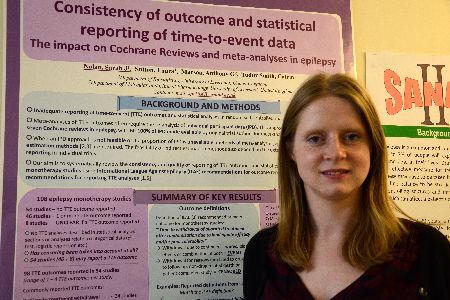
Sarah has been involved in the statistical analysis and writing reviews of anti-epileptic drug therapy
Sarah Nolan is a Research Assistant at the University of Liverpool’s Institute of Translational Medicine, and part time PhD student focused on medical decision making.
“I am involved in a National Institute of Health Research (NIHR) project focused on interventions for epilepsy in the NHS based in the Cochrane Epilepsy Group, one of the 53 review groups of the Cochrane Collaboration based in the Department of Molecular and Clinical Pharmacology.
As part of this project, I have been involved in the statistical analysis and writing of high quality systematic reviews of anti-epileptic drug therapy and surgical interventions for epilepsy. I have also started working as a statistician and author for the Cochrane Cystic Fibrosis and Genetic Disorders Group at Liverpool’s Institute of Child Health.
My research considers the advantages of conducting analysis on participant level data from clinical trials run by academic institutions, pharmaceutical industries and government departments, based on summary results published in journal articles.
This approach allows for more complex medical research questions to be considered, such as examining different effects of medications in various age groups, by disease type or according to different medical histories. It could potentially allow greater understanding of medical conditions and lead to more informed treatment decisions for a patient, based on individual characteristics.
Fast moving
It is a very exciting time to be involved in this research field due to recent changes within the pharmaceutical industry and a drive towards transparent sharing of clinical trial data to ensure that data provided by individuals who participate in clinical research is used to the maximum effect in the creation of knowledge and understanding.
Software has been developed in order for anonymised participant data to be provided to researchers in a secure, remote environment in order to protect the privacy of the research participants.
This is a very fast moving area which I have enjoyed being involved in, particularly through assisting with user testing and feedback of newly developed software, contributing to working groups for methods of anonymisation of participant data and providing an academic researcher’s perspective of data transparency at conferences to members of the pharmaceutical industry and software developers.
These new initiatives are still moving forward and developing rapidly. I am looking forward to seeing whether all of the changes bring only advantages to academic researchers such as myself and evidence based medicine overall or whether the new initiatives bring new challenges for research.
I hope to continue research in this area for many years to come, providing a voice for academic research along the way.”